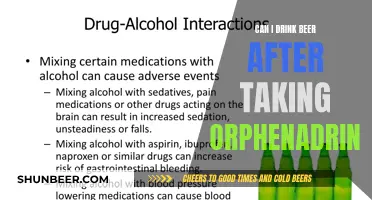
Drinking bad beer is unlikely to make you sick, but it might make you feel unpleasant. While it is rare for pasteurised beer to go bad, unpasteurised beer can expire within a couple of weeks. Beer is resistant to becoming infected or spoiled, and the bacteria that cause food poisoning are not associated with beer. However, some people have reported feeling sick after drinking infected beer.
| Characteristics | Values |
|---|---|
| Can drinking bad beer make you sick? | It is rare for pasteurized beer to make you sick. Unpasteurized beer can expire within a couple of weeks and may make you sick. |
| Reasons for sickness | Food poisoning, alcohol poisoning, or an over-balance of acid in the GI system. |
| Bacteria in beer | Common bacteria in beer will turn it into vinegar or something resembling a lambic. |
| Beer storage | Beer should be stored in a cool, dark place. |
What You'll Learn

Beer expiration dates
Beer does have an expiration date and it does go bad, but it won't make you sick. The worst thing that will happen is that it will taste bad. Beer is preserved by hops, which have antimicrobial characteristics, and alcohol content, so there is no risk of pathogenic bacterial growth.
The shelf life of beer varies depending on the type and storage conditions. Most beers are best consumed within 6 to 9 months if stored at room temperature. Refrigeration can extend this period to up to 2 years. Unpasteurized or craft beers may have a shorter shelf life.
Heat causes beer to go bad more quickly than if it's refrigerated or stored in a cool cellar. As a rule of thumb, you can keep beer at 90°F for only 3 days before it goes bad. It will last 30 days at 72°F, which is around room temperature. Finally, beer will last up to 300 days at 38°F.
Opened beer has a shelf life of about a day, regardless of the expiration date listed.
Light exposure, especially UV rays, can cause beer to develop a skunky odor and taste. This is more prevalent in beers packaged in clear or green bottles. Brown bottles offer better protection, and cans completely shield beer from light, helping to preserve its quality longer.
Beer Drinking: Weight Loss or Gain?
You may want to see also

Beer storage
- Temperature Control: Light and heat can accelerate a beer's best-before date, so refrigeration is ideal for maintaining its original taste. The optimal temperature range for storing beer is between 45 and 55 degrees Fahrenheit (7-13 degrees Celsius). Keep beer in a cool, dark place, ideally between room temperature and freezing.
- Container Type: Beer can be stored in cans, bottles, growlers, kegs, or corked bottles. Each container type has specific storage recommendations:
- Cans: Store cans in a cool, dry place, always above freezing. Cans should be kept upright to minimise oxidation and limit beer's exposure to oxygen.
- Bottles: Store bottles in a similar manner to cans, in a cool, dry place, and upright. Brown glass bottles offer better protection against UV rays, helping to keep the beer fresh.
- Growlers: Often made of brown glass, growlers can protect beer from UV rays. Ensure the growler seals properly and store it in a cool place. Beer stored in growlers may have a shorter shelf life as it is typically unpasteurised.
- Kegs: Maintain a consistent temperature for kegs and store them in a dark place. Keep kegs upright and away from other foodstuffs to reduce contamination risks.
- Corked Bottles: Store corked beer upright to prevent yeast rings from forming. Corked beer tends to mature faster, so consume it within a year and a half of bottling.
- Avoid Light Exposure: Skunking occurs when beer reacts with light, resulting in a foul odour and taste. Use brown bottles or cans to minimise light strike and avoid clear or green glass bottles. Store beer in a dark environment, such as a basement or garage, especially in cooler climates.
- Minimise Movement: For long-term storage, minimise movement of containers to prevent chemical changes that can affect the beer's flavour.
- Storage Duration: Beer has varying recommended drinking dates depending on the type. Pale ales and lagers typically have a 12-month recommended drinking date, while sour and imperial stouts can have up to 25 years. Beer generally starts to decline in quality after its best-before date, and improper storage accelerates this decline.
- Storing Opened Beer: Once opened, beer should be resealed with an airtight cap to reduce oxidation and loss of carbonation. Opened beer should be consumed as soon as possible, as it will quickly lose carbonation.
The Magic Behind Beer: A Brewery Tour
You may want to see also

Beer spoilage
There are three categories of beer spoilers: obligate beer spoilage bacteria, potential beer spoilage organisms, and indirect beer spoilage microorganisms. Obligate beer spoilers, such as Lactobacillus brevis, Pediococcus damnosus, and Megasphaera spp., will always cause spoilage. Potential beer spoilers, including some lactic acid bacteria and exogenous yeast, will only grow under certain conditions, such as low alcohol or hop content. Lastly, indirect beer spoilers cannot grow in beer but may be present in the raw materials used during brewing.
The presence of these microorganisms can lead to sensory changes in the beer, such as unpleasant odours and off-flavours, as well as increased turbidity. This can negatively impact the quality of the final product and result in financial losses for brewing companies.
To maintain the quality of their product, breweries must implement thorough quality control measures and test their beer for various contaminants. Traditional microbiological detection methods, such as incubation on culture media, can be time-consuming and impede production processes. As a result, rapid alternative methods like PCR tests, which provide results within a few hours, are becoming increasingly important in the brewing industry.
Beer and Tonsillitis: Is It Safe to Drink?
You may want to see also

Food poisoning from beer
It is highly unlikely that beer can cause food poisoning. While it is possible for beer to be contaminated with foodborne pathogens, the conditions required for this to occur are rare. Traditional beers (up to 10% ABV) contain numerous intrinsic and extrinsic factors that prevent pathogens from proliferating or propagating. The low pH, presence of ethanol and hop acids, limited oxygen, and specific processing techniques such as wort boiling, pasteurisation, filtration, cold storage, and handling all contribute to microbial stability and safety.
The types of bacteria and fungi that cause sickness are generally unable to survive in beer. Before it becomes beer, all of the water and ingredients that will be used are boiled, which accounts for much of beer's safety. Beer is also alcoholic, acidic, and saturated with CO2, which makes it difficult for bacteria to survive. There is also almost no sugar in beer, as it has been consumed by the yeast.
While it is possible to get sick from drinking old or infected beer, this is usually not caused by food poisoning pathogens. Instead, it may be due to an over-balance of acid in the gastrointestinal system, or simply a repulsive reaction to the smell and taste of the beer.
In rare cases, beer can be contaminated with foodborne pathogens if there is a change or absence of the usual antimicrobial factors. For example, a study found that E. coli O157:H7 and Salmonella survived in nonalcoholic beers for over 2 months. However, this is not a common occurrence, and it is much more likely that any negative reaction to beer is caused by an allergy, intolerance, or sensitivity to one of its ingredients.
Ethanol Distillation Simplified: Beer Stripper Method
You may want to see also

Alcohol poisoning from beer
Alcohol poisoning is a dangerous and potentially life-threatening condition that can occur from drinking large amounts of alcohol, including beer, in a short period of time. It is important to note that alcohol poisoning can affect anyone, regardless of their alcohol tolerance, weight, age, or gender.
When a person consumes excessive amounts of alcohol, their body may be unable to process the alcohol content quickly enough, leading to a rapid increase in blood alcohol content (BAC) levels. This can result in impaired mental, physical, and emotional functions, even after the person has stopped drinking. The effects of alcohol poisoning can be severe, and it is crucial to seek immediate medical attention if you or someone you know is experiencing symptoms.
The signs and symptoms of alcohol poisoning include unconsciousness or semi-consciousness, slow respiration (eight or fewer breaths per minute), cold, clammy, pale, or bluish skin, and a strong odour of alcohol. It is important to act quickly if you suspect someone is experiencing alcohol poisoning, as the consequences can be fatal. Call emergency services and stay with the person until medical help arrives.
While it is uncommon to get food poisoning from drinking bad beer, it is possible to experience other unpleasant effects such as an upset stomach or intestinal issues. Additionally, drinking infected beer may cause acid indigestion or heartburn due to the over-balance of acid in the gastrointestinal system caused by wild yeasts and bacteria.
Drinking Beer and Taking Bactrim: What You Need to Know
You may want to see also
Frequently asked questions
Drinking bad beer will not make you sick, but it might taste unpleasant. The pH level of beer is low enough that no known pathogens can survive in it. However, it can cause acid indigestion or heartburn due to the over-balance of acid in the gastrointestinal system.
Exposure to light causes beer to become skunked. Beer is often sold in dark bottles to reduce the effect of light, with dark brown bottles offering better protection than green bottles.
Unopened beer in cans or bottles can last at least six months, but its taste will deteriorate over time.







